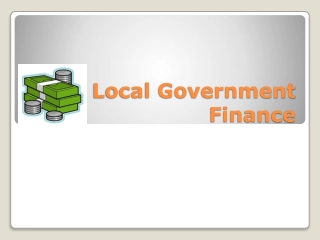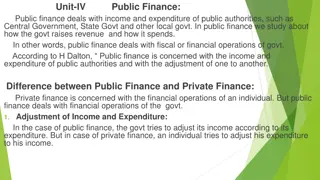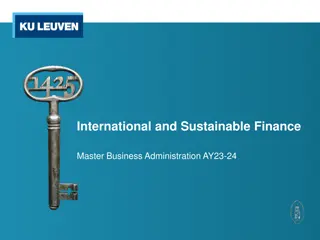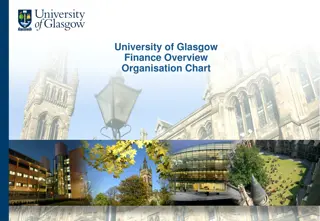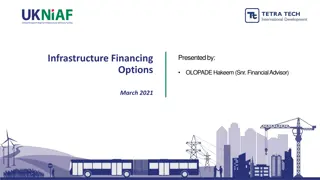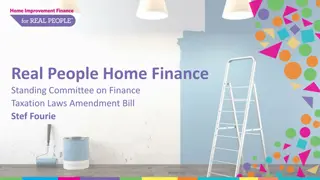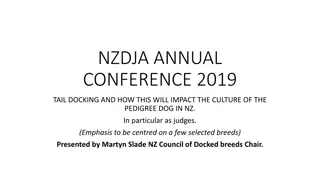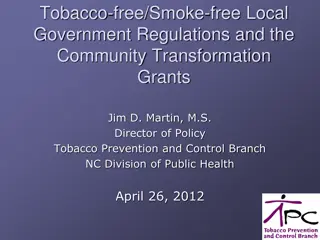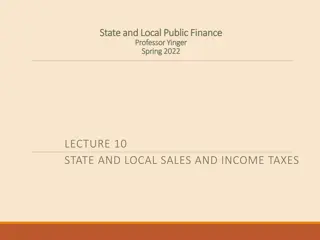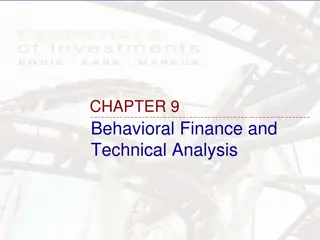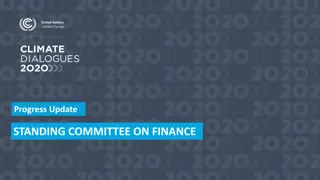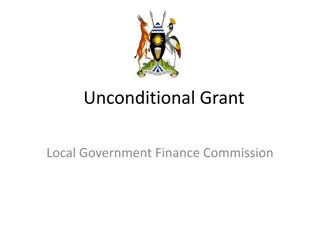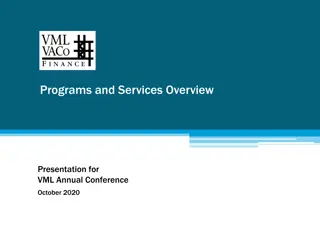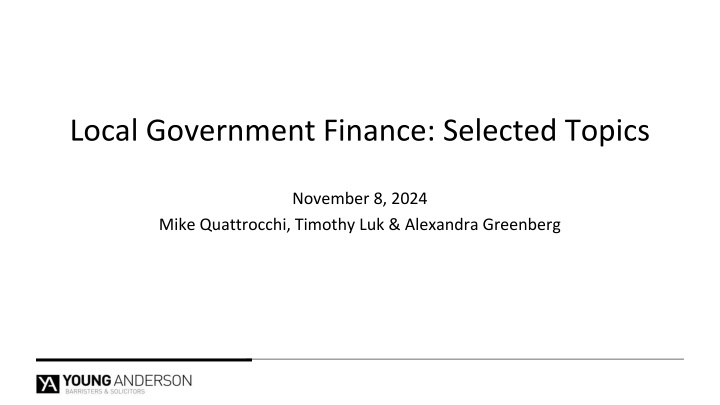
Local Government Finance: Funding Options for New Library Construction
"Explore funding options for constructing a new library in Spenderville to meet the growing demands of the community. Learn about borrowing types, revenue anticipation, short-term borrowing, and long-term solutions under local government finance laws."
Download Presentation

Please find below an Image/Link to download the presentation.
The content on the website is provided AS IS for your information and personal use only. It may not be sold, licensed, or shared on other websites without obtaining consent from the author. If you encounter any issues during the download, it is possible that the publisher has removed the file from their server.
You are allowed to download the files provided on this website for personal or commercial use, subject to the condition that they are used lawfully. All files are the property of their respective owners.
The content on the website is provided AS IS for your information and personal use only. It may not be sold, licensed, or shared on other websites without obtaining consent from the author.
E N D
Presentation Transcript
Local Government Finance: Selected Topics November 8, 2024 Mike Quattrocchi, Timothy Luk & Alexandra Greenberg
Scenario Welcome to the City of Spenderville! With a growing population and increasing demands for public services, the city has recognized the need to expand its community facilities. Spenderville s Council has decided that it s time to construct a new library to serve as a central hub for learning, community events and programs for residents of all ages. However, acquiring land and building the library will require funds that exceed the city s annual budget. To fund this project, Spenderville s Council must consider its funding options. Local Government Finance:Local Government Finance: Selected Topics
Funding the Library Option 1: Borrow Types of Borrowing Revenue Anticipation Borrowing (s. 177 CC) Short-Term Borrowing (s. 178 CC) Reserve Fund Borrowing (s. 189 CC) MFA Financing of Local Government Agreement Liabilities (s. 11.1 MFA Act) Long-Term Borrowing (s. 179 CC) Local Government Finance:Local Government Finance: Selected Topics
Types of Borrowing (cont.) Revenue Anticipation Borrowing (s. 177 CC) By bylaw Limit Cannot exceed the sum of unpaid taxes imposed during the year and amounts owed by other governments If borrowing occurs before the annual tax bylaw is adopted, the unpaid taxes are deemed to be 75% of the previous year s total No electoral or Inspector approval required Local Government Finance:Local Government Finance: Selected Topics
Types of Borrowing (cont.) Short-Term Borrowing (s. 178 CC) Term: up to 5 years By bylaw No electoral approval required Inspector s approval required Limit - up to $50 per capita Reserve Fund Borrowing (s. 189 CC) Using funds in one reserve for purpose of another reserve Must repay first reserve For capital expenses only Ministerial approval for DCCs and other specific reserves Local Government Finance:Local Government Finance: Selected Topics
Spenderville Council Decision: Long-Term Borrowing Section 179 of CC For up to 30 years or the life expectancy of the capital asset (if shorter time-period) Limited Purposes Through the Municipal Finance Authority under the Municipal Finance Authority Act In 10 Easy Steps! Local Government Finance:Local Government Finance: Selected Topics
Step 1: Financial Capacity? Financial Plan 5-year plan Identify: Borrowing Sources of repayment Liability Limit Municipal Liabilities Regulation Local Government Finance:Local Government Finance: Selected Topics
Step 2: The Bylaw Required Content - 179 CC 3 readings Local Government Finance:Local Government Finance: Selected Topics
Step 3: Provincial Approval The Inspector After 3 readings, before next steps Liability Servicing Limit Certificate Inspector s Approval (s. 179(1) CC) LG to provide: Financial Plan Funding Sources Capital Budget Staff or Consultant Reports Method of Electoral Approval Local government may appeal Inspector refusal to approve loan authorization bylaw pursuant to section 762 LGA Local Government Finance:Local Government Finance: Selected Topics
Step 4: The Electors Assent voting or alternate approval process After 3 readings After Inspector s approval Exceptions (s. 180(2) CC) no elector approval needed for money borrowed: For court, arbitration and expropriation requirements For works required to be carried out under an order of the Inspector of Dikes or under section 84 [abatement of municipal pollution], 85 [environmental protection orders] or 87 [environmental emergency measures] of the Environmental Management Act Where prescribed by regulation e.g. approval-free liability zone under Municipal Liabilities Regulation Local Government Finance:Local Government Finance: Selected Topics
Steps 5 & 6: Bylaw Adoption & Inspector Certificate of Approval Bylaw Adoption One Month Quashing Period (s. 623(4) LGA) Corporate Officer s Certificate Certificate of Approval (s. 760 LGA) Local Government Finance:Local Government Finance: Selected Topics
Step 7: Temporary Borrowing Temporary Borrowing (s. 181 CC, s. 409 LGA) By bylaw After a loan authorization bylaw approved Temporary until MFA financing in place Cannot exceed difference between amount authorized by loan authorization bylaw and amount already borrowed in relation to that loan authorization bylaw May proceed directly to long-term debenture debt through a regional district security issuing bylaw (s. 182 CC) Local Government Finance:Local Government Finance: Selected Topics
Step 8: Regional District Consent Municipal Security Issuing Resolution (ss. 122, 182 CC) Send a loan authorization bylaw, certificate of approval, liability servicing limit certificate and municipal security issuing resolution to the regional district Regional district security issuing bylaw (ss. 410, 411 CC) 3 readings and adoption Email a copy of the adopted security issuing bylaw to the MFA 10-day quashing period (s. 425 LGA) Corporate Officer s Certificate Certificate of Approval (s. 760 LGA) Local Government Finance:Local Government Finance: Selected Topics
Step 9: MFA Funding from Municipal Finance Authority Repay Temporary Borrowing Local Government Finance:Local Government Finance: Selected Topics
Step 10: Repay Borrowing Impose & collect property taxes Local Government Finance:Local Government Finance: Selected Topics
Funding the Library Option 2 Save $ Local Government Finance:Local Government Finance: Selected Topics
What About ACCs? Amenity Cost Contribution Bill 46 (2023) Section 570 of the Local Government Act Similar to a DCC Collected through development applications Can be used only for amenities Local Government Finance:Local Government Finance: Selected Topics
Amenity Cost Charge Is an ACC appropriate for this situation? "amenity" means a facility or feature that provides social, cultural, heritage, recreational or environmental benefits to a community, including, without limitation, (a) a community, youth or seniors' centre, (b) a recreational or athletic facility, (c) a library, (d) a day care facility, and (e) a public square, but does not include a facility or feature within a class of facilities or features that are prescribed by regulation not to be amenities; Local Government Finance:Local Government Finance: Selected Topics
Amenity Cost Charge Is an ACC appropriate for this situation? Anticipating growth Not a DCC charge Lands rezoned through Bill 44 Lands rezoned as a pre-zoning process Consider in-stream precursor applications Local Government Finance:Local Government Finance: Selected Topics
Imposing the ACC An ACC regime is created (and imposed) through an ACC Bylaw, which must : Identify the ACC area Include a list of amenities for each area Specify the amount of the charge (or charges) imposed in a schedule attached to the bylaw Local Government Finance:Local Government Finance: Selected Topics
Developing the ACC Bylaw Consultation: Local governments must provide one or more opportunities it considers appropriate for consultation with: (a) the public, and (b) persons, public authorities and organizations that the local government considers will be affected by the bylaw Local Government Finance:Local Government Finance: Selected Topics
Developing the ACC Bylaw Considerations: (while setting the area and amenities) In setting the ACC area and listing the amenities that will receive funding from the charge, a local government must take the following into consideration: applicable official community plans and other relevant planning documents expected increases in the population of residents and workers the local government's financial plan and any other information prescribed by regulation Local Government Finance:Local Government Finance: Selected Topics
Developing the ACC Bylaw Setting the Charge: (s.570.7) May be set as a charge: per lot or per unit in a development, or per square metre of floor space in the development The charge must be similar for all developments that are expected to result in a similar increase in the population of residents or workers An ACC may vary with respect to: different ACC areas in the bylaw different zones different uses different sizes or different numbers of lots or units in a development any other basis for variation prescribed by regulation Local Government Finance:Local Government Finance: Selected Topics
Developing the ACC Bylaw Setting the Charge Considerations: (s.570.7) In setting amenity cost charges, a local government must take the following into consideration: the capital costs of amenities that will receive funding from the charge the phasing of amenities whether the charges are excessive in relation to the capital cost of prevailing standards of service in the municipality or regional district whether the charges will deter development, or discourage the construction of reasonably priced housing or the provision of reasonably priced serviced land and any other information prescribed by regulation Local Government Finance:Local Government Finance: Selected Topics
Developing the ACC Bylaw Setting the Charge - Deductions: In setting amenity cost charges, deduct the following from the estimated capital cost of each amenity in an area: the portion of the estimated capital cost to be funded by grants and other sources of funding that are external to the municipality or regional district the portion of the estimated capital cost to be allocated to the existing population of the area and, as a result, funded by the local government and the portion of the estimated capital cost to be allocated to the development but funded by the local government Local Government Finance:Local Government Finance: Selected Topics
Developing the ACC Bylaw Setting the Charge Waiver and Reduction: Waiving or Reducing an ACC is permitted only for: (s.570.6) not-for-profit rental housing, including supportive living housing for-profit affordable rental housing housing that is subject to requirements under an affordable and special needs housing zoning bylaw ACCs may only be waived by bylaw, which: must establish what constitutes an eligible development must establish amount or rate of reduction may establish requirements to be fulfilled by eligible developments Local Government Finance:Local Government Finance: Selected Topics
The ACC Bylaw In Action Collecting the Amenity Cost Charge: An ACC is imposed on every person who obtains: (s.570.2) subdivision approval a building permit authorizing the construction, alteration, or extension of a building or structure Once collected, the ACC must be deposited into a separate special ACC reserve fund (once for each area) (s.570.8) Local Government Finance:Local Government Finance: Selected Topics
The ACC Bylaw In Action Collecting the Amenity Cost Charge: Certain developments are not subject to an ACC charge: (s.570.4) places of worship affordable and special needs housing units required under inclusionary zoning pursuant to section 478.1 where there is no increase in population (residents or workers) from the development the ACC charge has already been paid for that development if a DCC could be charged for the same capital cost any class of affordable housing prescribed by regulation (Prescribed Classes of Affordable Housing (Local Government Act) Regulation, BC Reg 156/2024) developments with precursor applications that were in-stream upon adoption (s.570.91) Local Government Finance:Local Government Finance: Selected Topics
The ACC Bylaw In Action Using the Amenity Cost Charge: (570.8) The funds may only be used for: capital costs for providing, constructing, altering, or expanding the amenity paying principal and interest on debt incurred as a result of above expenditures paying a person subject to an ACC who enters into an agreement to provide the amenity (or land for the amenity) There needs to be a bylaw authorizing the above payments Local Government Finance:Local Government Finance: Selected Topics
The ACC Bylaw In Action Reporting on the ACC Bylaw (570.92) An annual report must be prepared and considered by the local government on or before June 30th. The report must include: the amount of amenity cost charges received the expenditures from the ACC reserve funds, including the expenditures made to a person or public authority under a partnering agreement the balance in the amenity cost charge reserve funds at the start and at the end of the applicable year any waivers and reductions any amenities provided by a person under section 570.9 [provision of amenity instead of all or part of charge] any other information prescribed by regulation Local Government Finance:Local Government Finance: Selected Topics
Local Government Finance: Selected Topics Any Questions? Local Government Finance:Local Government Finance: Selected Topics


